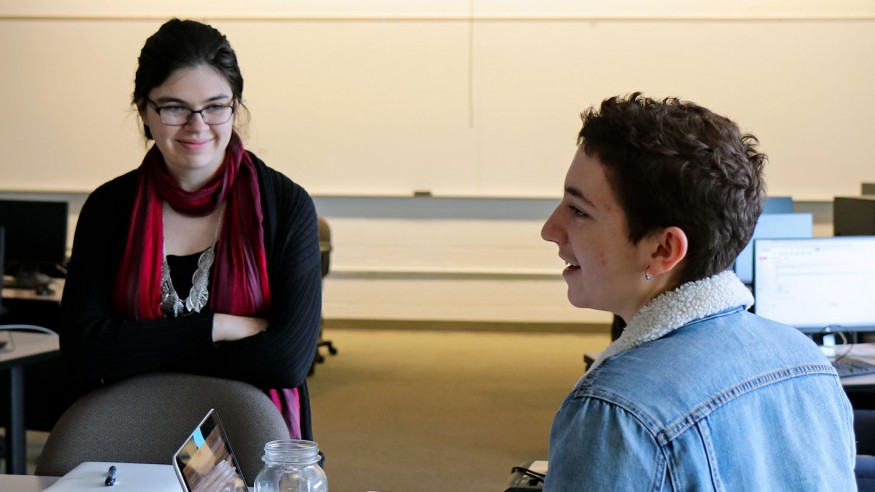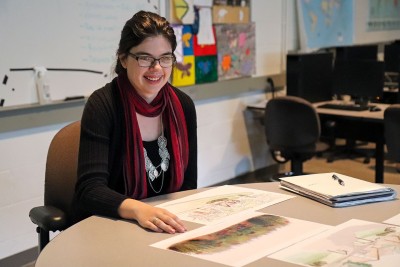
A Sustainable Plan
Ohio Wesleyan Adopts ‘Aspirational and Inspirational’ Green Goals
If sustainability efforts were a garden, Ohio Wesleyan’s plot would be filled with eye-catching annuals. Emily Howald ’18 hopes to help the University plant more perennials – environmentally conscious programs that root permanently in the campus culture.
Howald, an environmental studies and zoology double-major from Bucyrus, has spent more than a year reviewing past and current green initiatives at the University; discussing their feasibility and desirability with OWU students, faculty, and staff; and helping to coalesce three years’ worth of related information into a cohesive document.
“The hope was to give everyone on campus a chance to contribute,” said Howald, who plans to pursue a doctorate in environment studies after graduating in May.
Articulating OWU’s Objectives
The result is the newly approved Ohio Wesleyan Sustainability Plan, an “aspirational and inspirational” text designed to articulate OWU’s guiding principles and inform future sustainability efforts. The plan outlines Ohio Wesleyan’s goals to:
- Commit to a sustainable future on campus and in the community.
- Reduce OWU’s impact on global climate change.
- Increase the community’s health and well-being.
- Live better on campus and on earth.
“Every goal has a large body of knowledge behind it,” Howald said, which she hopes will help to provide “singular purpose and direction” for the campus moving forward.
Collaborating on a Book Chapter
In addition to helping to write Ohio Wesleyan’s Sustainability Plan, Howald also was able to collaborate on a book chapter published in November as part of OWU alumnus Woodrow “Woody” Clark’s new book, “Sustainable Cities and Communities Design Handbook, Second Edition: Green Engineering, Architecture, and Technology.”
Howald met Clark, Ph.D., over Reunion Weekend in May, when she learned of his forthcoming book and of his hope to share the sustainability efforts of a small college as part of the text. Clark ’67 was a contributor to the United Nations Intergovernmental Panel on Climate Change that won a Nobel Peace Prize in 2007.
“We had a week to write the chapter,” said Howald, who worked on the quick-turn project with geology and geography professor John Krygier, Ph.D., who also serves as OWU’s director of environmental studies.
Incorporating Past Experiences
Krygier also oversaw Howald’s work on the Ohio Wesleyan Sustainability Plan, completed in her role as sustainability student assistant. Work on this initiative dates back to 2015, when students in Krygier’s upper-level sustainability practicum compiled a 40-page sustainability document.
Over time, other students in his practicum and members of the University’s Sustainability Task Force helped to refine the document, with Howald editing and creating the final plan over the summer.
“The plan is a somewhat remarkable example of practice-into-theory,” Krygier said, noting that often new sustainability projects begin with great enthusiasm but don’t last as students graduate and interests change.
“It is based on experiences and identifies the broader issues and lessons learned,” Krygier said of the plan. “Out of these experiences grew theories of sustainability.”

Exploring Future Initiatives
One lesson learned, he said, is that community gardens tend not to last overtime in fixed locations. As a result, Krygier said, the Sustainability Task Force has collaborated with OWU’s Buildings and Grounds staff to design movable gardens – large planters that can be transported with a forklift and even stored when not in use.
Another initiative under exploration is the construction of a chimney swift tower to support a local bird population that is dwindling because of a lack of houses with accessible chimneys and of large hollowed-out trees.
And a final initiative being considered would create a literal perennial project that blooms year after year as a colorful reminder of Ohio Wesleyan’s commitment to sustainability.
The proposed project would combine campus and City of Delaware efforts to create a rain garden outside of Branch Rickey Arena. The garden would bloom from April to November with a profusion of plants including pink phlox, blue flag iris, black-eyed Susan, and butterfly milkweed.
Maintaining a Successful Move Out
While those projects remain tentative, one successful initiative that will return to campus this spring is the May Move Out, which helps students to recycle furniture, small appliances, clothing, and other materials when they move out of their campus residences for the summer.
During May Move Out, special collection pods are placed outside student residents and items recycled – usually about 10 tons’ worth each year – are donated to Goodwill Industries.
Sowing Valuable Seeds
President Rock Jones, Ph.D., said he is impressed with the work of students, faculty, and staff over the past several years to promote sustainability at Ohio Wesleyan.
“It is very gratifying to see so many people passionate about the environment collaborating to create a plan that helps to guide of all of us as we think about sustainability,” Jones said. “These efforts have provided valuable hands-on experience for many OWU students and sown seeds that I am sure will have a positive, long-term impact on the planet for decades to come.”
Learn more about sustainability efforts at Ohio Wesleyan at https://sustainability.owu.edu.
